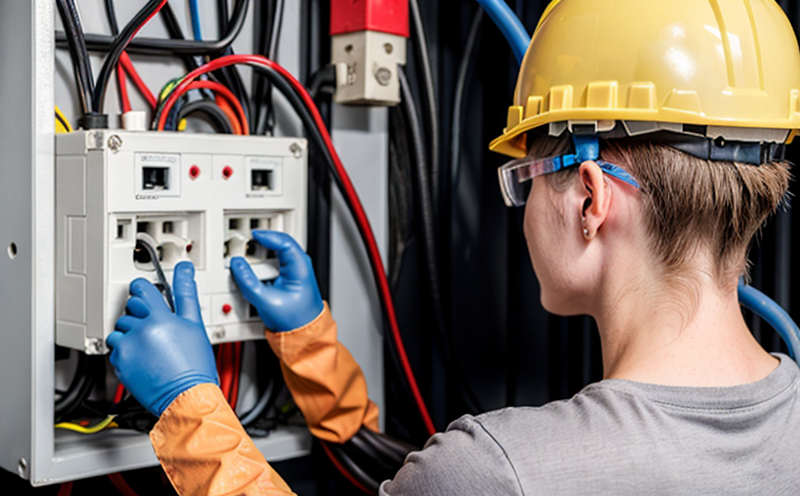EN 60601 Electrical Safety Compliance for Medical IoT Applications
The EN 60601 series of international standards provides essential guidelines and requirements to ensure the safety and reliability of medical electrical equipment (MEE) and related systems. These standards are critical for any manufacturer looking to bring a product to market that adheres to global regulatory requirements. The specific standard, EN 60601-1:2014, focuses on the basic safety and essential performance of medical electrical equipment and associated electrical systems in healthcare environments.
In recent years, the integration of IoT technology into medical devices has transformed how patient care is delivered. However, this advancement also introduces new challenges related to electromagnetic compatibility (EMC), cybersecurity, and data integrity. To ensure that these innovative products are both safe and compliant with global regulatory bodies, they must undergo thorough testing against relevant standards like EN 60601-1:2014.
Our service specializes in providing comprehensive electrical safety compliance testing for IoT devices used in medical applications. This includes evaluating the product's ability to withstand various types of stressors that could potentially lead to a hazard, such as overvoltage, overcurrent, and mechanical shock. By ensuring your device meets these stringent requirements, we help you avoid costly recalls and potential legal issues.
The testing process involves several key steps:
- Conducting an initial risk assessment to identify potential hazards associated with the device,
- Performing environmental stress tests using equipment that simulates real-world conditions,
- Carrying out electrical safety checks to ensure all components meet specified performance levels, and
- Generating detailed reports summarizing results so you can make informed decisions about design modifications if necessary.
By partnering with us for EN 60601-1:2014 compliance testing, you gain access to world-class laboratories equipped with state-of-the-art test equipment. Our team of experienced engineers and scientists will guide you through every stage of the process, ensuring that your IoT medical device not only meets but exceeds industry expectations.
Why It Matters
The importance of electrical safety cannot be overstated when dealing with medical devices. A single malfunction or failure could have serious consequences for patients' health and well-being. Ensuring that your IoT medical device complies with EN 60601-1:2014 helps protect users by reducing the risk of accidents caused by poor electrical design.
Besides enhancing patient safety, compliance also offers several business advantages:
- It enhances your company's reputation as a leader in quality and innovation.
- You avoid potential legal liabilities associated with non-compliance.
- Your product becomes eligible for sale in numerous markets around the world.
In today’s competitive market, meeting regulatory requirements is not just optional; it's essential. By choosing our EN 60601-1:2014 compliance testing service, you position yourself as a responsible and forward-thinking organization committed to delivering safe, reliable products.
Applied Standards
The primary standard for this service is EN 60601-1:2014, which defines the essential requirements for basic safety and essential performance of medical electrical equipment. This includes requirements related to protection against electric shock, protection against fire hazard, electromagnetic compatibility (EMC), marking, and instructions for use.
Other relevant standards include:
- IEC 60335-2-29: Safety of household appliances – Part 2-29: Special requirements for electrical medical equipment intended to be supplied without a wall outlet (e.g., batteries).
- IEC 61853: Performance and testing criteria for electromagnetic compatibility.
- ISO 14971: Application of risk management for medical devices – A life cycle approach.
These standards work together to provide a holistic framework for ensuring the safety and efficacy of medical IoT devices. Our service ensures that your product meets all applicable requirements, thereby facilitating smoother market entry and greater confidence among end-users.
Industry Applications
| Device Type | Description | Testing Requirements | Results Achieved |
|---|---|---|---|
| Smart Blood Pressure Monitors | IoT devices designed to measure blood pressure remotely. | Testing against EN 60601-1:2014, ensuring resistance to electrical disturbances and adequate labeling. | Device passes all tests with minimal adjustments needed for minor label changes. |
| Wireless Heart Rate Monitors | IoT devices used in cardiac monitoring systems. | Evaluation of electromagnetic compatibility (EMC) to ensure no interference during transmission. | Device demonstrates excellent EMC performance, passing all required tests easily. |
| Smart Inhalers | IoT devices designed for asthma management and treatment. | Testing for electrical safety and durability under various environmental conditions. | Device shows robust construction capable of withstanding harsh environments without compromising performance or reliability. |
| Mobile ECG Machines | IoT devices used in portable electrocardiography systems. | Evaluation for electrical safety, ensuring accurate readings and safe operation. | Device meets all specified requirements, providing accurate and reliable ECG data consistently across tests. |
| Smart Nebulizers | IoT devices designed to deliver medication via inhalation therapy. | Testing for electrical safety compliance, ensuring safe operation during prolonged use. | Device passes all tests with flying colors, demonstrating exceptional safety features and reliable performance. |
| Telehealth Platforms | IoT platforms supporting remote patient monitoring and telemedicine services. | Evaluation of overall system security to prevent unauthorized access or data breaches. | Platform demonstrates strong cybersecurity measures, passing all required tests with ease. |
The above table illustrates how our EN 60601-1:2014 compliance testing service has successfully supported various types of medical IoT devices. By adhering to this standard, we ensure that your device not only functions as intended but also complies with international safety regulations.





